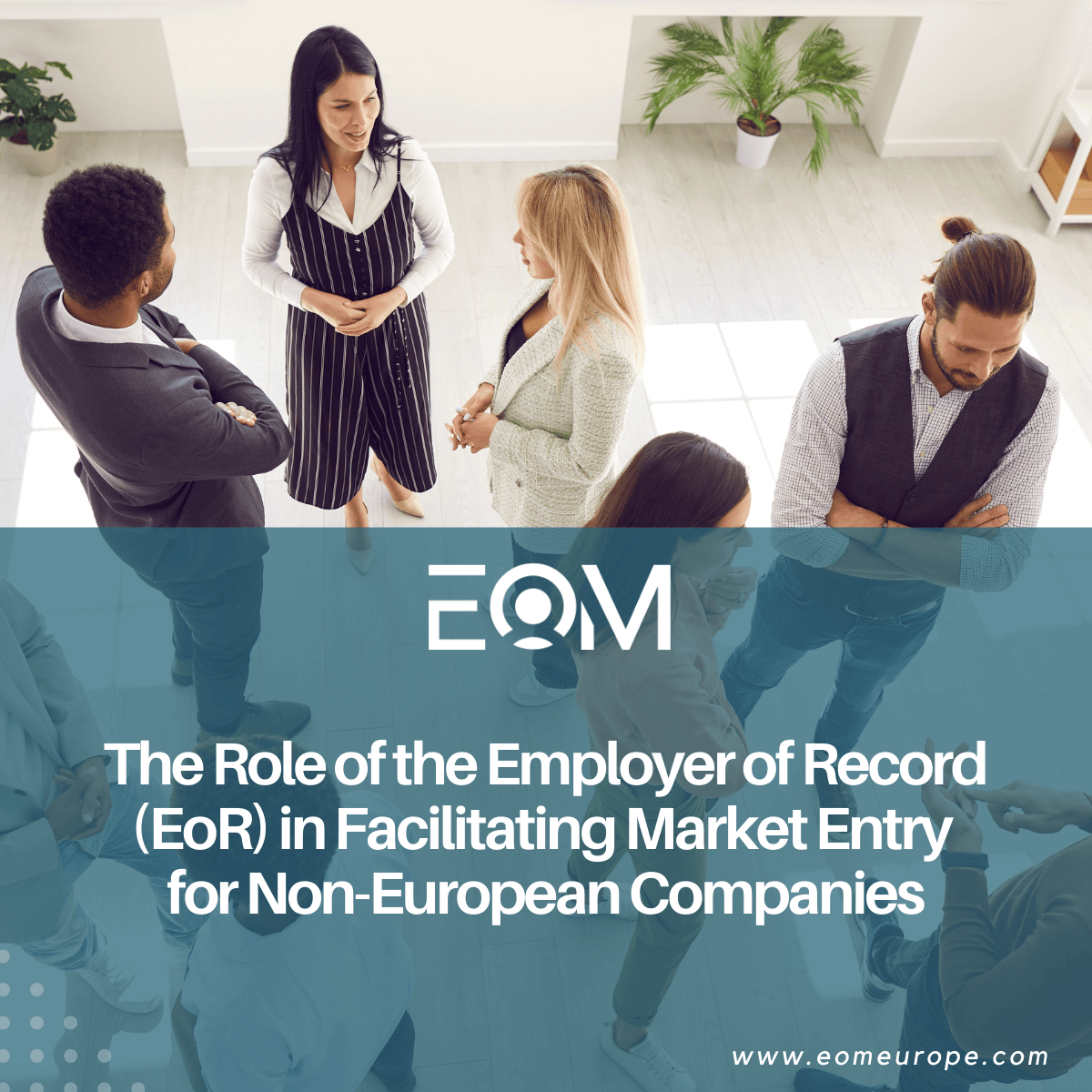The Role of the Employer of Record (EoR) in Facilitating Market Entry for Non-European Companies

The Role of the Employer of Record (EoR) in Facilitating Market Entry for Non-European Companies
Introduction
As globalisation continues to evolve, non-European companies are increasingly eyeing the European market for expansion. This region offers vast opportunities due to its diverse economies, skilled workforce, and robust infrastructure. However, entering the European market is fraught with complexities, particularly concerning diverse labour laws, social charges, taxes, and immigration regulations. This is where an Employer of Record (EoR) becomes invaluable, simplifying these processes and enabling smoother operations.
Navigating Diverse Labour Laws
Europe is not a monolithic entity regarding labour regulations; each country has its unique set of employment laws. Non-European companies must understand and comply with these intricate regulations to avoid legal pitfalls.
- Local Jurisdiction Compliance
EoRs ensure compliance with local labour laws, minimising risks associated with employment actions such as hiring, firing, and workforce management. This includes correct adherence to employment contracts, working hours, and termination procedures. - Labour Law Expertise
By leveraging EoR services, companies can tap into on-the-ground expertise, ensuring that employment practices are not only legal but also culturally sensitive and accepted. This is crucial for maintaining a harmonious work environment and avoiding legal disputes.
Managing Social Charges and Taxes
Social charges and taxation are another significant challenge for non-European companies. These costs can vary widely between countries and substantially impact financial planning.
- Accurate Calculation and Remittance
EoRs handle the complex calculations of social charges and taxes, ensuring accurate payments to the relevant authorities. Miscalculations can lead to penalties and increased scrutiny from tax officials. - Optimisation and Reporting
EoRs provide guidance on optimising social charge structures and tax compliance, potentially reducing the financial burden while ensuring that all obligations are met.
Environmental Considerations and Corporate Responsibility
While navigating labour laws and tax regulations, non-European companies must also consider their environmental impact and corporate responsibility.
- Sustainable Practices Implementation
EoRs can help implement environmentally friendly practices in accordance with European standards, which can be more stringent than in other parts of the world.
Management of Work and Residence Permits
Acquiring work and residence permits for foreign employees is a nuanced and often challenging process. Delays or denials can significantly hinder business operations.
- Permit Processing
EoRs manage the bureaucratic aspects of obtaining work and residence permits, ensuring that all paperwork is in order and submitted correctly. Their local knowledge can accelerate the process and improve approval rates. - Compliance Monitoring
By continuously monitoring compliance with visa and work permit requirements, EoRs help prevent issues arising from expired permits or changes in immigration law, thereby avoiding potential disruptions.
Facilitating Market Entry
An EoR can be pivotal in helping non-European companies gain a foothold in the European market:
- Speed to Market
EoRs can expedite market entry by handling the administrative burdens and ensuring swift compliance with local laws, enabling companies to start operations faster. - Cost Efficiency
The use of EoR services can be more cost-effective than setting up a local legal entity, which involves substantial time, money, and effort. - Risk Mitigation
By managing compliance risks associated with labour laws, taxation, and immigration, EoRs provide a layer of security, protecting companies from potential legal and financial repercussions.
Conclusion
Expanding into the European market presents tremendous opportunities for non-European companies but also introduces multifaceted challenges requiring expert navigation. Employer of Record (EoR) services play a critical role in this process by ensuring compliance with diverse labour laws, managing social charges and taxes, embedding sustainable practices, and handling work and residence permits. By leveraging the expertise and support of an EoR, non-European companies can mitigate risks, streamline operations, and successfully establish a presence in the vibrant European market.
In an increasingly competitive global landscape, partnering with an Employer of Record can be the strategic advantage non-European companies need to achieve sustainable growth and operational excellence in Europe.
Post
🌍 Expanding into Europe? Let’s make it smooth and successful using www.eomeurope.com ! 🚀
As globalization reshapes the business landscape, non-European companies are keenly exploring European markets. But it’s not just about taking opportunities—it’s about smart navigation. 🧭
Enter the Employer of Record (EoR). 🤝 Your ally in managing the complex maze of labor laws, social charges, and tax intricacies. From ensuring compliance to facilitating swift market entry, an EoR is your strategic advantage for sustainable growth in Europe. 🌟
👉 Why struggle with administrative burdens when you can focus on what you do best? Let an EoR (www.eomeurope.com ) smooth out the operational and regulatory hurdles, ensuring a seamless transition into vibrant European markets.
#MarketEntry #GlobalExpansion #EuropeanBusiness #EmployerOfRecord #BusinessGrowth #EOMeurope



